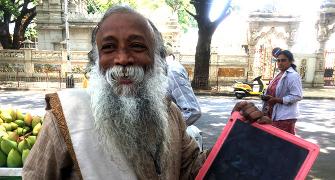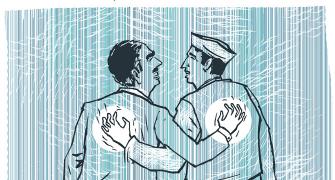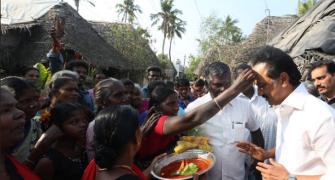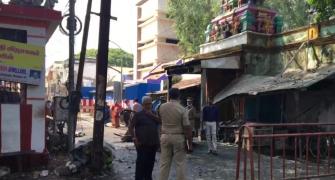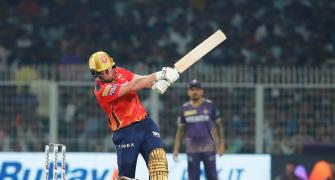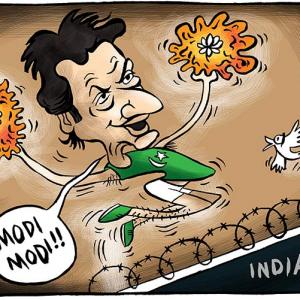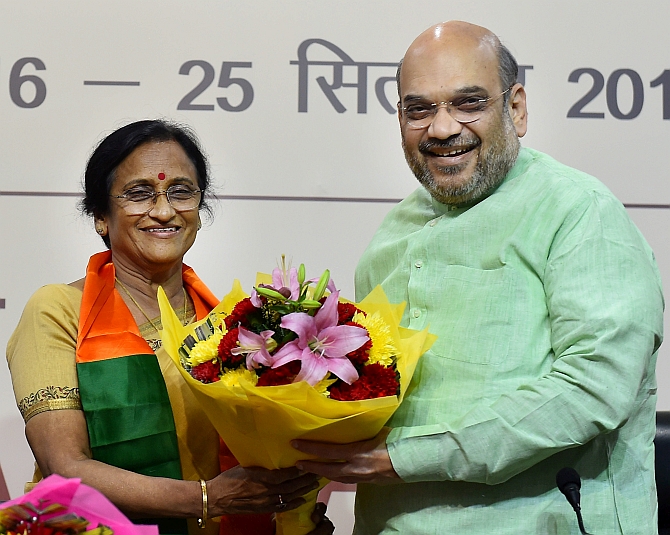Arun Shourie, who made a name as an editor par excellence before he chose to join politics, put it in perspective: 'The Rafale judgment enables the media to its job.'
Don't miss Saisuresh Sivaswamy's Must Read column!
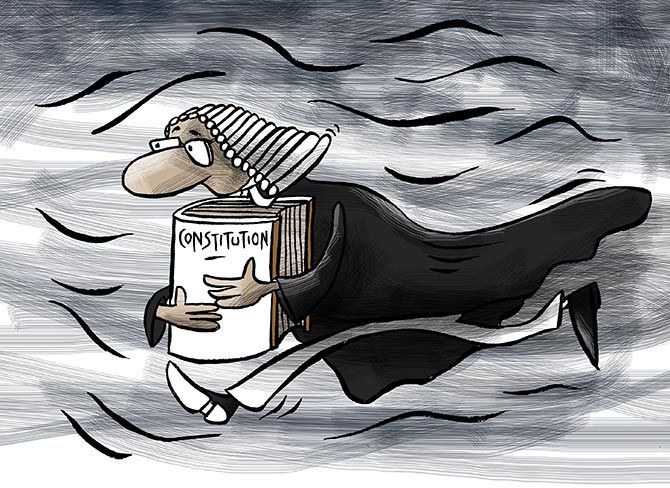
By any yardstick, the 3-judge Supreme Court bench ruling on Wednesday, agreeing to hear the petitions seeking a review of its December 14, 2018, verdict, is a blow to the government, which has so far held up the latter ruling as a 'clean chit' for it.
Spinmeisters on behalf of the establishment may demur, but the matter is as clear as the summer sky.
Not only did the government tom-tom the December verdict as a validation of its stand, it also unleashed a broadside on the petitioners for citing leaked defence ministry documents published in The Hindu to buttress their claim for a review of the judgment.
In fact, the government side went so far as to say that those who conspired in photocopying the documents committed theft and endangered the national interest, and argued against the admittance of the review petitions saying the documents adduced were unauthorisedly removed from the defence ministry and hence cannot be admissible as evidence.
So, when you go out on a limb with such ludicrous claims, and get rebuffed roundly by the apex court, with the three judges issuing two different but unanimous rulings, there is little wiggle room left for you.
But the biggest implication from the verdict concerns not the government, not the Opposition, not the opacity or otherwise of defence deals in India, but the upholding of freedom of the press, which is an intrinsic part of Freedom of Expression since unlike the oldest democracy we don't have a First Amendment explicitly guaranteeing this right.
Chief Justice of India Ranjan Gogoi wrote in his judgment: 'No question has been raised and, in our considered opinion, very rightly, with regard to the publication of documents in The Hindu newspaper. The right of such publication would seem to be in consonance with the Constitutional guarantee of freedom of speech.'
Given that this was ringing blow for press freedom, especially at a time when concerns have been expressed once again, on the eve of elections, that there has been a gradual shrinking of various rights, including that of expression, one would have expected our nightly TV debates to focus on this aspect, but alas, given the season we live in, most of them chose to focus on the politics stemming from the verdict.
NDTV got Arun Shourie, who had made a name for himself as an editor par excellence upholding the freedom of the press much before he chose to join the world of politics (this rider being added for the sake of the younger readers who may not know of Editor Shourie), who put it in perspective, even though, as is his wont in both text and speech, he took up a lot of words to say it: 'The Rafale judgment enables the media to its job.'
But very clearly the juicy part of the debate lay elsewhere, especially since Congress Pesident Rahul Gandhi's inferences from the verdict went much beyond what the honourable judges had said and meant.
'The Supreme Court has said the chowkidar is a chor,' he thundered at some rally, which provided the cue for Times Now's Navika Kumar to ask indignantly of the 'dear viewers' if what Rahul said was right. Of course, it was not, but then so aren't many things that are being said during this election season.
India Today TV saw a lively but predictable tu-tu-mein-mein under the watchful eye of Rajdeep Sardesai, with the BJP's Navin Kohli and the Congress’s Pawan Khera going at each other over the Rafale judgment.
When Khera sought to imply that the government, and Prime Minister Narendra Damodardas Modi, were guilty of wrongdoing in the matter, Kohli questioned promptly, 'What standards of jurisprudence are these? Sonia and Rahul are both out on bail in the National Herald case, so will you say that they are guilty in the matter, or will you wait for the final judgment in the matter?'
Khera responded, 'But this government tried to fool the Supreme Court but failed.'
But Kohli wouldn't let go. 'Behind every defence scam right from independence, from the jeep scandal then to the Agusta Westland, the Congress is involved. Since his father was involved in the Bofors scam, they are trying desperately to pin a scam on us where none exists, they are manufacturing a scam.'
And Khera asked, 'You will go to town against Rahul Gandhi from all forums, but want us to keep quiet?'
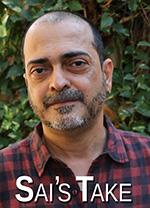
The interesting point about TV debates is that most channels have imposed some sort code on the guests. Like, no interference while the other side is talking; no heckling; no personal attacks; and say your piece within the allotted time.
So the debates of late seem mostly civilised. All, that is, except on one TV channel which seems to believe more in noise than news.
CNN-News18 too was onto the question of media freedom and freedom of expression, but over the Election Commission's decision to defer the release of the Modi biopic, and if such bans make sense in the digital age.
Bhupendra Chaubey had rounded up a band of interesting people to discuss the matter, including Aman Panwar, the petitioner who had fought against the movie's release at this time through various channels, including legal.
Others on the panel included, among others, film-maker Vivek Agnihotri whose own Tashkent Files is facing the heat, and his wife Pallavi Joshi, and Sanjay Hegde,. the Supreme Court lawyer.
Panwar was at pains to explain that the Modi biopic was out and out propaganda, produced by BJP members, acted in by a BJP member (Vivek Oberoi) and its release at this time skewed the field in favour of the ruling party, and he did not seek, nor was he given, a ban on the film but only a deferment of its release beyond the elections.
BJP Spokesperson Narendra Taneja wanted to know if being the member of a political party, or releasing a film at this time, was illegal. Say, would you also stop a 2-hour profile of the prime minister commissioned by a TV channel for being propaganda?
For some strange reason, Chaubey was interested in giving the floor more to Pallavi Joshi than to other participants, and the actress's sole worthwhile contribution was to say that she was against kind of ban, against all censorship, and she was all for freedom of expression, and bans don't make sense to her.
As Sanjay Hegde and Panwar kept asking to speak and Chaubey chose to let Pallavi continue, the lawyer could be heard asking if he was wanted on the show or not, echoing the thought of his other co-panellists.
Finally, getting to speak, Hegde said during election time the Election Commission alone is responsible to decide if something constituted unfair practices or not.
If Chief Election Commissioners like T N Seshan or James Lyngdoh were around now, people would not have had the courage to even launch such a film, leave alone releasing it, the most valid point made on the show on Wednesday evening.

